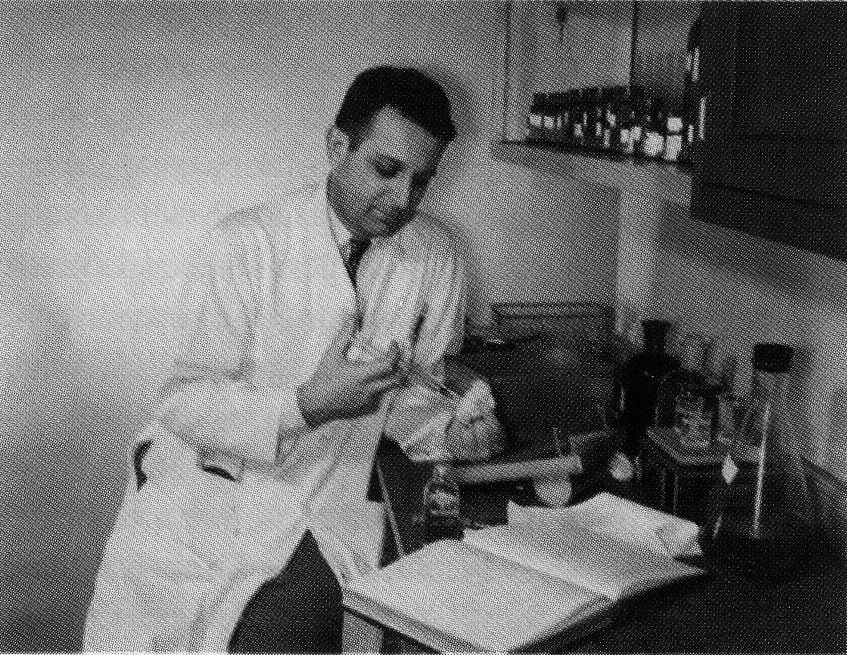When James F. Holland, MD, started out as a young physician in the 1950s, acute lymphoblastic leukemia (ALL) was a fatal disease. Nothing much could be done after the diagnosis: Chemotherapy was still a relatively new treatment and didn’t cure anyone. ALL is more common among children than adults, and in 1970, Look magazine reported that nine out of 10 pediatric ALL patients died within a year of diagnosis, even as their parents “tried to cram a lifetime of loving into brief months.”
Today about 90 percent of pediatric ALL patients will be cured, due largely to work led by Dr. Holland. The former Chief of Medicine at Roswell Park died March 22, 2018, at age 92.
After two years of service as a captain in the U.S. Army Medical Corps (1949-51), Dr. Holland began his career at the National Cancer Institute (NCI) in Bethesda, MD, where he worked closely with scientist Lloyd Law, PhD. Law had discovered two key principles: first, that cancer cells are naturally resistant to chemotherapy, and second, that resistance can be overcome more effectively when multiple drugs are given at the same time instead of one after another.
Dr. Holland applied that information to his own studies, and in 1953 he launched the first NCI clinical trial, studying the effectiveness of combining the drugs methotrexate and 6-mercaptopurine for the treatment of acute leukemia. The trial was still underway when he accepted a position at Roswell Park the following year, so he and colleagues at the NCI and Children’s Hospital of Buffalo (now known as Oishei Children’s Hospital of Buffalo) worked together to continue the study at all three institutions.
This was the first multi-center study of chemotherapy for cancer, organized by the newly created Acute Leukemia Group B (ALGB). The group’s goal was to combine the expertise of physicians and enroll sufficient numbers of patients from the cooperating centers so that the studies would generate strong data. The ALGB went on to make major contributions to the treatment of breast cancer, lymphomas, osteosarcoma and acute myeloid leukemia.
Never miss another Cancer Talk blog!
Sign up to receive our monthly Cancer Talk e-newsletter.
Sign up!The Cowboys of Cancer Research
In a 2012 interview for the Roswell Park alumni magazine, Dr. Holland recalled that many physicians scorned the group as “cowboys” who broke the conventional rules of cancer treatment, “but we could point to remissions, which other people didn’t have.”
In the 1970s, he directed a clinical trial of an acute leukemia treatment now known as “7 and 3,” because it combined seven days of infusion with the drug cytarabine and three days of injections of daunorubicin. The treatment worked so well that it became — and remains — the worldwide standard of care for acute myeloid leukemia (AML). (A man who was 49 when he enrolled in the 7 and 3 clinical trial in 1970 will celebrate his 97th birthday in June.)
Acute leukemia, Dr. Holland said, must be treated “in a hospital that has the proper resources. That includes a balanced staff of older specialists who have the wisdom that years of doing gives them, as well as trained young investigators with fresh ideas.” The hospital, he added, should have the latest drugs, equipment and facilities to deal with the effects of the disease and the side effects of treatment.
During his years at Roswell Park, Dr. Holland organized the Institute’s Clinical Research Center and designed four germ-free units for immunosuppressed leukemia patients that became models for other centers.
Working to the End
“Dr. Holland was such a force in oncology, and such a model for how to care for your patients with both passion and ingenuity,” says Candace Johnson, PhD, President and CEO of Roswell Park Comprehensive Cancer Center. “We’re so inspired by all he accomplished, and proud to know that some of his most groundbreaking ideas first took root during his time at Roswell Park.
“When I think of how central a concept combination therapy is to the field of cancer treatment today, I can’t help being especially grateful for all Jim Holland and his colleagues have done for cancer patients across many decades. Our hearts go out to his family for the loss of this man we all loved and admired. He was an absolute giant, and so incredibly influential.”
Dr. Holland’s wife, Jimmie Holland, MD, who died in December 2017, was a psychiatrist who was among the first to stress the need to address the psychological effects of a patient’s cancer diagnosis.
At the time of his death, Dr. Holland served as Distinguished Professor of Neoplastic Diseases at the Icahn School of Medicine at Mount Sinai Medical Center in New York City. He continued working until the end, telling Cancer Crossings author Tim Wendel, “Time is of the essence in any of this…If I can get a few more years, I sincerely believe I can help find a cure for other cancers. It’s always a race, you see.”
